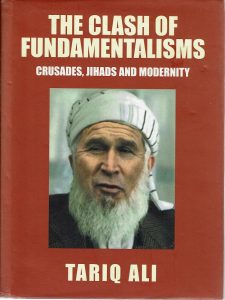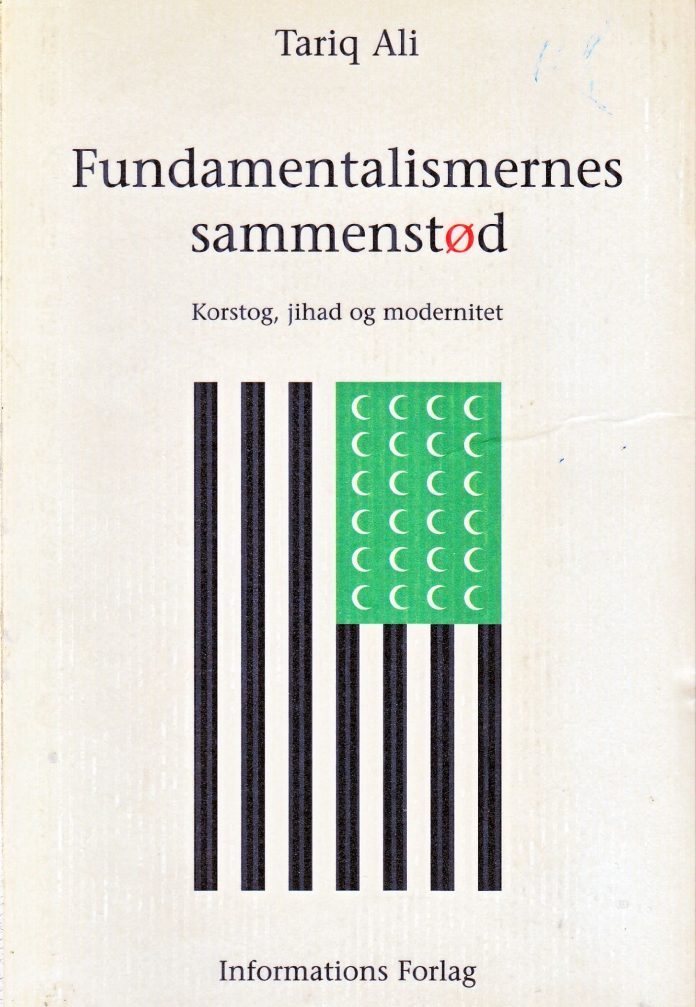Forord
Tariq Alis bog fra 2002, The clash of fundamentalisms, kom i en dansk udgave i 2004. Bogen er en form for modsvar til den konservative ideolog Samuel P. Huntingtons tese om The clash of civilizations fra 1993. Tariq Ali taler i stedet om ‘fundamentalismernes sammenstød’ – religion vs. imperie, og i bogen fastholder han en dobbelt kritik, både mod den vestlige imperialisme og mod den reaktionære politiske islam.
Her har vi samlet materiale om bogen: boguddrag og engelske og danske anmeldelser.
Bjarne A. Frandsen
November 2004
Revideret april 2019
Se også den samhørende personliste om Tariq Ali (Socialistisk Bibliotek)
Fundamentalismernes sammenstød: korstog, jihad og modernitet
Af Tariq Ali (Informations Forlag, 2004, 430 sider)
Med indledning af Michael Irving Jensen og Karsten Wind Meyhoff (s.9-16)
“Bogen fortæller om den islamiske historie og om begivenhederne, der førte til oprettelsen af staten Israel. Gennem historiske analyser af situationen i blandt andet Mellemøsten og Indonesien anskueliggøres grundlaget for det omfattende had til Vesten efter terrorangrebene d. 11. september 2001.”
Se:
Indholdsfortegnelse og uddrag fra Tariq Alis prolog på Informations Forlag.
Indhold
- Anmeldelser på dansk
- Anmeldelser på engelsk/Reviews in English
- Uddrag fra bogen/Excerpts from the book
Se også på Socialistisk Bibliotek:
- Emneoversigten: Bøger
- Emnelisten: Tariq Ali
- Emnelisten: Samuel P. Huntingtons Civilisationernes Sammenstød
Anmeldelser på dansk
Historie-online.dk
BogFeature ved Søren Hove (2004)
“Det, som derimod gør bogen interessant i forhold til andre analyser, er den allestedsnærværende, underliggende politiske agenda, hvormed Tariq Ali angriber den amerikanske imperialisme. ‘Fundamentalismernes sammenstød’ er i højere grad et politisk statement og et partindlæg end egentlig historieskrivning.”
Information
Lars Erslev Andersen: Fundamentalismens tredje vej (29. november 2004)
“Skønt bogen handler om to fundamentalismer er der faktisk tre, når man tæller Alis egen med. Kan man under læsningen glemme denne historisk materialistiske fundamentalisme og lade de værste polemiske udfald passere, er den tid, det tager at læse Alis store bog, godt brugt.”
Fundamentalismens moder bærer slips, ikke turban. Interview med Tariq Ali ved Mette Jørgensen Rodgers (6. november 2004)
“Den ene er iført jakkesæt og slips. Den anden en hvid kjortel og turban. Den ene er kristen. Den anden muslim. Begge har de magt, penge og våben til at påføre verden død og ødelæggelse. Styret af deres egeninteresser er det præcist, hvad de gør. Så langt lighederne mellem amerikanske imperialister og islamiske terrorister. Forskellen mellem dem er, at den ene er verdens stærkeste supermagt. Den anden en gruppe på 2.000-3.000 individer.”
Rune Lykkeberg: Første og anden fundamentalisme (9. september 2002)
“Historie, litteratur og pamfletpolemik krydser hinanden i Tariq Alis bog de store civilisationer og det store hverken-eller.”
Modkraft.dk/Kontradoxa
Inge Kongsgaard Hansen: Fundamentalismernes sammenstød (11. februar 2005)
“Der er rigtig mange vigtige pointer i Tariq Alis historieskrivning. Hans hovedanliggende er at nuancere opfattelsen af islam som politisk-religiøs størrelse, og det er lykkedes til fulde.”
Solidaritet
Ågot Berger: Fundamentalismernes sammenstød (nr.1, februar 2005). P.T. ikke online.
“Bogen … viser at den muslimske verden ikke er én størrelse, at der har været debat, og skønt debatten er mindre dynamisk i dag, så er den der.”

Anmeldelser på engelsk/Reviews in English
CounterPunch
Vijay Prashad: Fettered histories (May 10, 2002)
“From Tariq Ali comes an extraordinary book, perhaps his best. The Clash of Fundamentalisms contains a sweeping secular history of Islam, a witty biography of Ali and his important family, and an astute analysis of the political destiny of a region that stretches from the Arab lands to South Asia.”
International Socialism
Sam Ashman: Islam and imperialism (Issue 95, Summer 2002, s.125-130)
“If you are not familiar with the history of the Middle East and South Asia it provides a pacy introduction. If you are, it provides a timely reminder written with some style. More importantly, because Tariq Ali begins from opposition to US imperialism and to racism and inequality, he can conclude the book with a very powerful ‘Letter to a Young Muslim’. Here he argues that ‘the rise of religion is partially explained by the lack of any other alternative to the universal regime of neo-liberalism’, and that the ‘fundamentalism of the Empire has no equal today’. This is combined with a challenge to what Islamists have to offer in response.”
Marxmail.org
Louis Proyect: Tariq Ali’s ‘The Clash of Fundamentalisms’ (February 17, 2003)
“The book is an attempt to explain the historical roots of 9/11, the Kashmir conflict, the Palestinian Intafada and a number of other questions that are tied in one fashion or another to Islamic identity and politics. Speaking as somebody who has read nearly everything that Tariq Ali has ever written, I can without hesitation state that this is his greatest accomplishment. Not only is it supremely informative on matters of deep importance to radicals in the East and West, it is written with his characteristic grace and wit.”
The Nation
Anthony Arnove: Islam’s divided crescent (June 20, 2002)
“In The Clash of Fundamentalisms, a riposte to Samuel Huntington’s much-discussed ‘clash of civilizations’ thesis, Pakistani writer and filmmaker Tariq Ali sets the ambitious goal of challenging such organized historical amnesia – ‘the routine disinformation or no-information that prevails today’ – and of speaking forthrightly about many topics that have become unpopular or even heretical in the West, as well as within what he calls the House of Islam.”
Socialism Today
Review by Jim Horton (Issue 77, Sept 2003)
“Clash of Fundamentalisms provides a good outline of the origins of Islam in what is now Saudi Arabia, touching on many of the debates within Islam over the centuries. He traces the spread of Islam to Syria, Egypt and Iraq, and then to North Africa, Spain and India (and later Indonesia), and the rise and fall of the Ottoman Empire. The bulk of Tariq’s text though details the more recent often symbiotic and perfidious relationship between many Islamic groups and imperialism.”
Uddrag fra bogen/Excerpts from the book
CounterPunch
Letter to a young Muslim (CounterPunch, April 25, 2002)
“Remember when you approached me after the big antiwar meeting in November 2001 (I think it was Glasgow) and asked whether I was a believer? I have not forgotten the shock you registered when I replied no’, or the comment of your friend (‘our parents warned us against you’), or the angry questions which the pair of you then began to hurl at me like darts. All of that made me think, and this is my reply for you and all the others like you who asked similar questions elsewhere in Europe and North America.”
London Review of Books
Tariq Ali: Mullahs and heretics (Vol. 24, No. 3, 7 February 2002)
“There were many advantages in being an unbeliever. Threatened with divine sanctions by family retainers, cousins or elderly relatives – ’If you do that Allah will be angry’ or ’If you don’t do this Allah will punish you’ – I was unmoved. Let him do his worst, I used to tell myself, but he never did, and that reinforced my belief in his non-existence.”
Also online at CounterPunch: Mullahs and heretics: A secular history of Islam (October 17-19, 2014)
New Left Review
Tariq Ali: The clash of fundamentalisms : Prologue
“I want to write about Islam, its founding myths, its origins, its history, its culture, its riches, its divisions. Why has it not undergone a Reformation? How did it become so petrified? Should Koranic interpretations be the exclusive prerogative of religious scholars? And what do Islamist politics represent today? What processes led to the ascendancy of this current in the world of Islam? Can the trend be reversed or transcended?”
Tariq Ali: Letter to a young Muslim
“Remember when you approached me after the big antiwar meeting in November 2001 (I think it was Glasgow) and asked whether I was a believer? I have not forgotten the shock you registered when I replied no’, or the comment of your friend (’our parents warned us against you’), or the angry questions which the pair of you then began to hurl at me like darts. All of that made me think, and this is my reply for you and all the others like you who asked similar questions elsewhere in Europe and North America.”
På dansk i tidsskriftet Solidaritet: Brev til en ung muslim (nr.2, maj 2003, s.8-14; online på Internet Archive WayBackMachine).
Third World Traveler
Excerpts from the book: The Clash of Fundamentalisms


































